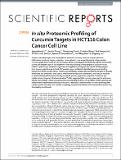In situ Proteomic Profiling of Curcumin Targets in HCT116 Colon Cancer Cell Line
Author(s)
Wang, Jigang; Zhang, Jianbin; Zhang, Chong-Jing; Wong, Yin Kwan; Lim, Teck Kwang; Hua, Zi-Chun; Liu, Bin; Shen, Han-Ming; Lin, Qingsong; Tannenbaum, Steven R; ... Show more Show less
DownloadWang-2016-In situ proteomic.pdf (1.074Mb)
OPEN_ACCESS_POLICY
Open Access Policy
Creative Commons Attribution-Noncommercial-Share Alike
Terms of use
Metadata
Show full item recordAbstract
To date, the exact targets and mechanism of action of curcumin, a natural product with anti-inflammatory and anti-cancer properties, remain elusive. Here we synthesized a cell permeable curcumin probe (Cur-P) with an alkyne moiety, which can be tagged with biotin for affinity enrichment, or with a fluorescent dye for visualization of the direct-binding protein targets of curcumin in situ. iTRAQ™ quantitative proteomics approach was applied to distinguish the specific binding targets from the non-specific ones. In total, 197 proteins were confidently identified as curcumin binding targets from HCT116 colon cancer cell line. Gene Ontology analysis showed that the targets are broadly distributed and enriched in the nucleus, mitochondria and plasma membrane, and they are involved in various biological functions including metabolic process, regulation, response to stimulus and cellular process. Ingenuity Pathway Analysis™ (IPA) suggested that curcumin may exert its anticancer effects over multiple critical biological pathways including the EIF2, eIF4/p70S6K, mTOR signaling and mitochondrial dysfunction pathways. Functional validations confirmed that curcumin downregulates cellular protein synthesis, and induces autophagy, lysosomal activation and increased ROS production, thus leading to cell death.
Date issued
2016-02Department
Massachusetts Institute of Technology. Department of Biological Engineering; Massachusetts Institute of Technology. Department of ChemistryJournal
Scientific Reports
Publisher
Nature Publishing Group
Citation
Wang, Jigang, Jianbin Zhang, Chong-Jing Zhang, Yin Kwan Wong, Teck Kwang Lim, Zi-Chun Hua, Bin Liu, Steven R. Tannenbaum, Han-Ming Shen, and Qingsong Lin. “In Situ Proteomic Profiling of Curcumin Targets in HCT116 Colon Cancer Cell Line.” Scientific Reports 6 (February 26, 2016): 22146. © 2016 Macmillan Publishers Limited
Version: Final published version
ISSN
2045-2322